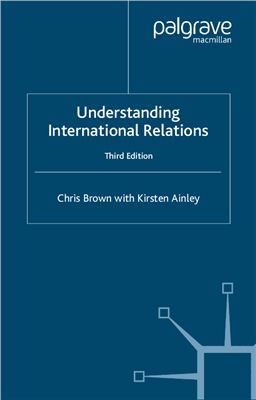Third edition 2005 Published by PALGRAVE MACMILLAN, 294 p.
Introduction: Defining Inteational Relations.
Perspectives and theories.
Conclusion.
The Development of Inteational Relations.
Theory in the Twentieth Century.
ntroduction.
Liberal inteationalism and the origins of the discipline.
The ‘realist’ critique of liberal inteationalism.
The post-war synthesis.
nteational Relations and the behavioural sciences.
Challenges to the realist synthesis.
Pluralism and complex interdependence.
nteational Relations Theory Today.
ntroduction: rational choice theory and its critics.
From realism to neorealism.
From neorealism to neoliberalism.
Constructivism and the ‘English School’.
Critical, poststructuralist and ‘postmode’.
nteational thought.
Conclusion.
The State and Foreign Policy.
ntroduction.
The state and Inteational Relations.
Foreign and domestic policy: the ‘decision’ as focus.
Conclusion: from foreign policy to power.
Power and Security.
ntroduction: statecraft, influence and power.
Dimensions of power.
Power, fear and insecurity.
Conclusion: managing insecurity.
The Balance of Power and War.
ntroduction.
The balance of power.
The political conception of war.
War in the twentieth century.
Conclusion: the end of state-centric Inteational Relations?
Global Goveance.
ntroduction: sovereignty, anarchy and global goveance.
Functionalism.
ntegration theory, federalism and neofunctionalism.
Global economic institutions: Bretton Woods and after.
nteational regimes and regime theory.
Global goveance and (collective) security.
The Global Economy.
ntroduction.
The growth of the world economy.
Problems and perspectives.
Structuralism.
The new global economy.
The end of the South?
Globalization.
ntroduction.
A new economy?
Neoliberalism and its critics.
New global problems – ‘Westfailure’?
Global civil society?
The Inteational Politics of Identity.
ntroduction.
Politics in industrial societies.
dentity politics post.
Globalization and postindustrial society.
Democracy promotion, Asian values and.
the ‘clash of civilizations’.
Pluralism and inteational society.
Conclusion.
nteational Relations and the Individual.
Human Rights, Humanitarian Law.
and Humanitarian War.
ntroduction.
Universal human rights.
Rights and inteational law.
Humanitarian intervention.
Conclusion.
US Hegemony and World Order.
ntroduction.
An American century – again?
deology and US strategic doctrine.
The significance of 9/.
The United States and Europe: Mars and Venus?
America, the war on terror and the non-Weste world.
Empire?
World order in the twenty-first century.
Bibliography.
Index.
Introduction: Defining Inteational Relations.
Perspectives and theories.
Conclusion.
The Development of Inteational Relations.
Theory in the Twentieth Century.
ntroduction.
Liberal inteationalism and the origins of the discipline.
The ‘realist’ critique of liberal inteationalism.
The post-war synthesis.
nteational Relations and the behavioural sciences.
Challenges to the realist synthesis.
Pluralism and complex interdependence.
nteational Relations Theory Today.
ntroduction: rational choice theory and its critics.
From realism to neorealism.
From neorealism to neoliberalism.
Constructivism and the ‘English School’.
Critical, poststructuralist and ‘postmode’.
nteational thought.
Conclusion.
The State and Foreign Policy.
ntroduction.
The state and Inteational Relations.
Foreign and domestic policy: the ‘decision’ as focus.
Conclusion: from foreign policy to power.
Power and Security.
ntroduction: statecraft, influence and power.
Dimensions of power.
Power, fear and insecurity.
Conclusion: managing insecurity.
The Balance of Power and War.
ntroduction.
The balance of power.
The political conception of war.
War in the twentieth century.
Conclusion: the end of state-centric Inteational Relations?
Global Goveance.
ntroduction: sovereignty, anarchy and global goveance.
Functionalism.
ntegration theory, federalism and neofunctionalism.
Global economic institutions: Bretton Woods and after.
nteational regimes and regime theory.
Global goveance and (collective) security.
The Global Economy.
ntroduction.
The growth of the world economy.
Problems and perspectives.
Structuralism.
The new global economy.
The end of the South?
Globalization.
ntroduction.
A new economy?
Neoliberalism and its critics.
New global problems – ‘Westfailure’?
Global civil society?
The Inteational Politics of Identity.
ntroduction.
Politics in industrial societies.
dentity politics post.
Globalization and postindustrial society.
Democracy promotion, Asian values and.
the ‘clash of civilizations’.
Pluralism and inteational society.
Conclusion.
nteational Relations and the Individual.
Human Rights, Humanitarian Law.
and Humanitarian War.
ntroduction.
Universal human rights.
Rights and inteational law.
Humanitarian intervention.
Conclusion.
US Hegemony and World Order.
ntroduction.
An American century – again?
deology and US strategic doctrine.
The significance of 9/.
The United States and Europe: Mars and Venus?
America, the war on terror and the non-Weste world.
Empire?
World order in the twenty-first century.
Bibliography.
Index.

